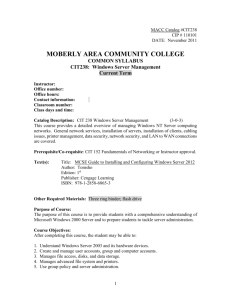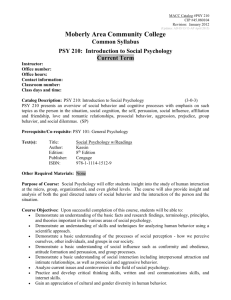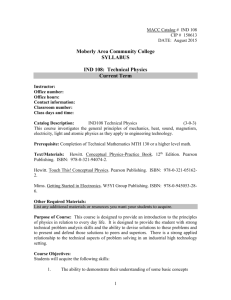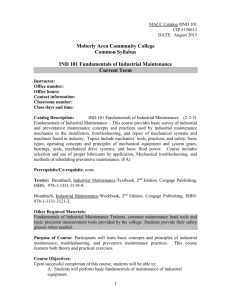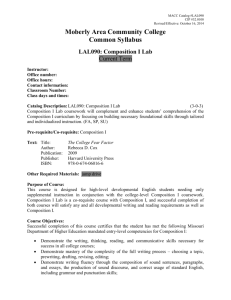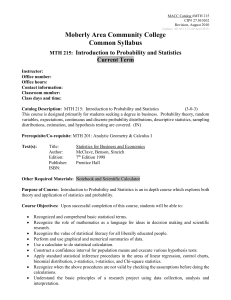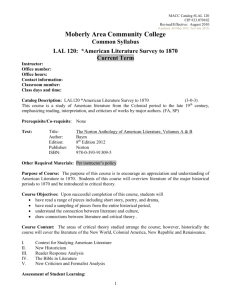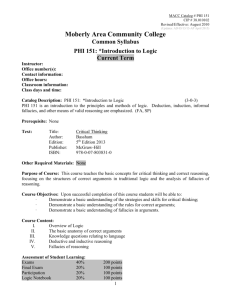PSY 205 Human Lifespan Development
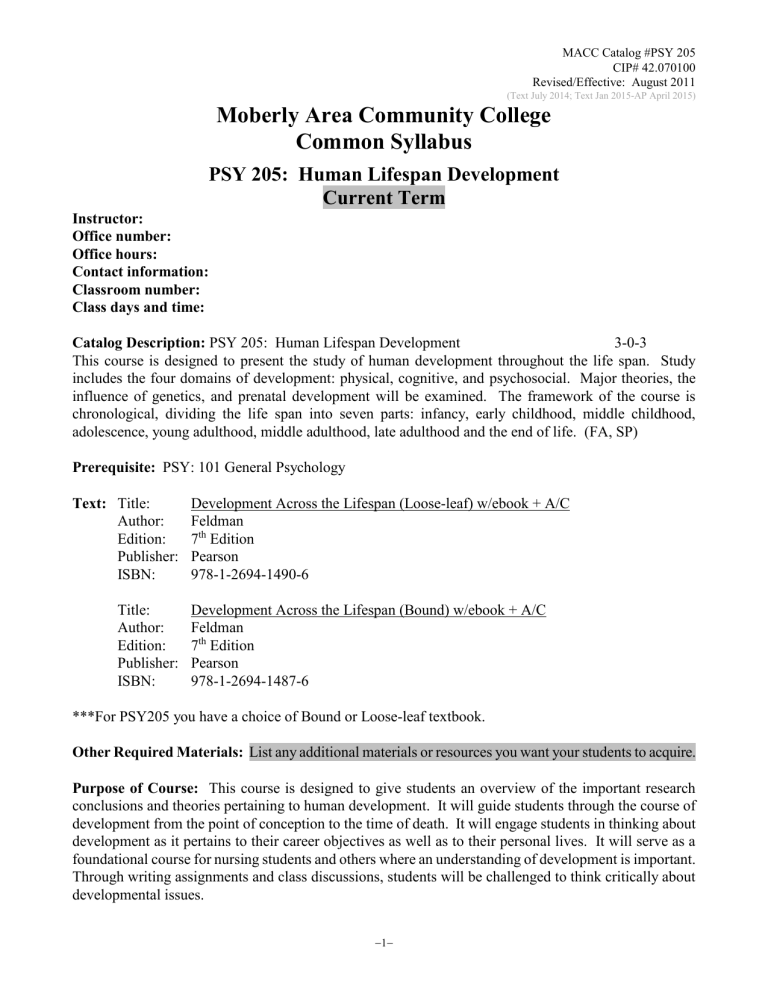
MACC Catalog #PSY 205
CIP# 42.070100
Revised/Effective: August 2011
(Text July 2014; Text Jan 2015-AP April 2015)
Moberly Area Community College
Common Syllabus
PSY 205: Human Lifespan Development
Current Term
Instructor:
Office number:
Office hours:
Contact information:
Classroom number:
Class days and time:
Catalog Description: PSY 205: Human Lifespan Development 3-0-3
This course is designed to present the study of human development throughout the life span. Study includes the four domains of development: physical, cognitive, and psychosocial. Major theories, the influence of genetics, and prenatal development will be examined. The framework of the course is chronological, dividing the life span into seven parts: infancy, early childhood, middle childhood, adolescence, young adulthood, middle adulthood, late adulthood and the end of life. (FA, SP)
Prerequisite: PSY: 101 General Psychology
Text: Title: Development Across the Lifespan (Loose-leaf) w/ebook + A/C
Author: Feldman
Edition: 7 th
Edition
Publisher: Pearson
ISBN: 978-1-2694-1490-6
Title: Development Across the Lifespan (Bound) w/ebook + A/C
Author: Feldman
Edition: 7 th Edition
Publisher: Pearson
ISBN: 978-1-2694-1487-6
***For PSY205 you have a choice of Bound or Loose-leaf textbook.
Other Required Materials: List any additional materials or resources you want your students to acquire.
Purpose of Course: This course is designed to give students an overview of the important research conclusions and theories pertaining to human development. It will guide students through the course of development from the point of conception to the time of death. It will engage students in thinking about development as it pertains to their career objectives as well as to their personal lives. It will serve as a foundational course for nursing students and others where an understanding of development is important.
Through writing assignments and class discussions, students will be challenged to think critically about developmental issues.
1
MACC Catalog #PSY 205
CIP# 42.070100
Revised/Effective: August 2011
(Text July 2014; Text Jan 2015-AP April 2015)
Course Objectives: The over-arching course objective is to provide the student with an overview of human development from conception to death. The following more specific objectives will guide our study.
1.
Acquire a basic understanding of the stages of human development.
2.
Know and understand basic developmental tasks at each stage of development.
3.
Comprehend the specific difficulties and tasks that come with each stage of development.
4.
Understand methods of doing research in the area of human development.
5.
Become familiar with various theories of development.
6.
The student will understand and identify the range of normal development for various ages.
7.
The student will be able to identify risks that have a negative impact on prenatal development.
8.
The student will be able to communicate current thinking about developmental issues in both written and verbal formats.
9.
The student will be able to demonstrate college level research and writing skills via an APA style research paper.
10.
The student will be able to display knowledge pertaining to physical, cognitive, personality, emotional, and social development across the lifespan.
Course Content:
A.
Orientation and Background of the lifespan perspective
B.
Research Design
C.
Theories of Development
D.
Heredity and Environment
E.
Childbirth
F.
The Newborn
G.
The Study of Children in Historical Perspective
H.
Childhood Physical Development
I.
Childhood Cognitive Development
J.
Childhood Personality & Emotional Development
K.
Childhood Social Development
L.
Perspectives on Adolescent Development
M.
Adolescent Physical Development and Sexual Maturation (Issues During Physical Development)
N.
Adolescent Cognitive Development
O.
Adolescent Personality & Emotional Development
P.
Adolescent Social Development
Q.
Perspectives on Adult Development (Important Issues and Theoretical Concerns)
R.
Adult Physical Development
S.
Adult Cognitive Development
T.
Adult Personality & Emotional Development
U.
Adult Social Development
V.
Death, Dying and Grief
Assessment of Student Learning: Describe how you plan to grade and what the requirements will be for various letter grades. Also describe the point values or percentages that assignments will be worth.
2
Description of Major Assignment(s)/Project(s): Describe the assignments and projects that are expected of the students.
MACC Catalog #PSY 205
CIP# 42.070100
Revised/Effective: August 2011
(Text July 2014; Text Jan 2015-AP April 2015)
Statement to Connect Course with General Education Outcomes or Technical Program Outcome
Statement:
In compliance with MACC’s General Education outcomes, the student who successfully completes this course will be able to:
Demonstrate effective written and oral communication skills
Demonstrate knowledge of how history has shaped society and culture, understand how the individual relates to society and culture, appreciate cultural diversity, understand human behavior and mental processes, and understand human development.
Instructor Policies:
Academic Dishonesty: MACC board policy is as follows: “Academic dishonesty by students damages institutional credibility and unfairly jeopardizes honest students; therefore, it will not be tolerated in any form.” Forms of academic dishonesty include but are not limited to the following: violations of copyright law, plagiarism, fabrication, cheating, collusion, and other academic misconduct. Incidents of dishonesty regarding assignments, examinations, classroom/laboratory activities, and/or the submission of misleading or false information to the College will be treated seriously. The procedure for handling academic dishonesty is outlined in the Student Handbook ( Policy Handbook M.010
). In cases of alleged academic dishonesty, the burden of proof is on the student, not on the instructor.
Attendance Policy: Any student who misses two consecutive weeks of class during a regular sixteenweek semester or the equivalent proportion of class time during a shorter session will be dropped from the class by the instructor unless acceptable justification is supplied. An instructor must complete and file the appropriate forms to drop the student within one week following the student’s violation of the attendance policy. Additionally, any student who misses more than one-fourth of the entire number of in-seat class meetings in a regular 16-week semester or the equivalent proportion of class time during a shorter session, may be dropped from that class by the instructor if, in the opinion of the instructor, the student does not have reasonable opportunity to succeed in the class. A student’s attendance rate will be calculated based upon the first day of the semester (not the student’s date of enrollment in the course.)
Student attendance must be defined in a different manner for online, hybrid, and virtual courses. Student attendance in these courses is defined as active participation in the course. Online, hybrid, and virtual courses will, at a minimum, have weekly mechanisms for student participation, such as any or all of the following methods: a. Completion of quizzes or exams b. Submission of assignments c. Participation in threaded discussions d. Communication with the instructor
3
MACC Catalog #PSY 205
CIP# 42.070100
Revised/Effective: August 2011
(Text July 2014; Text Jan 2015-AP April 2015)
A student who does not participate in an online, hybrid, or virtual course for two consecutive weeks will be dropped by the instructor unless acceptable justification is supplied. An instructor must complete and file the appropriate forms to drop the student within one week following the student’s violation of the attendance policy. As with ground courses, a student’s attendance rate in online courses will also be calculated based upon the first day of the semester. If a student does not demonstrate active participation in the online course within the first two weeks (or the equivalent proportion of class time during a short session), the student will be dropped as “never attended.” Simply logging into an online class does not constitute active participation.
Students should be aware that their dropping a course and their last date of attendance in the course may impact their financial aid. (Policy Handbook I.090 and M.095)
Tardiness: Per instructor’s policy
Make-up and late work: Per instructor’s policy
Extra-Credit Work: Per instructor’s policy
Schedule of Student Assignments/Activities: Instructors will identify a student assignment/ activities schedule. Instructors have the prerogative to construct the schedule by class periods, weeks, or an overview of topics to be covered.
ADA Statement
Students who have disabilities that qualify under the Americans with Disabilities Act may register for assistance through the Office of Access and ADA Services. Students are invited to contact the Access
Office to confidentially discuss disability information, academic accommodations, appropriate documentation and procedures. For more information, please call either the Moberly office at (660) 263-
4100 x11240 or the Columbia office at (573) 234-1067 x12120, or visit our web page at http://www.macc.edu/index.php/services/access-office .
Title IX Statement
MACC maintains a strict policy prohibiting sexual misconduct in any form, including sexual harassment, sexual discrimination, and sexual violence. All MACC employees, including faculty members, are considered mandated reporters of sexual misconduct and as such are expected to contact the Title IX
Coordinator when they become aware, in conversation or in writing, of an incident of sexual misconduct.
For more information on this policy or to learn about support resources, please see http://www.macc.edu/sexual-misconduct-policy or contact Dr. Jackie Fischer, MACC’s Title IX
Coordinator, at 660-263-4110, ext. 11236 or jackief@macc.edu.
4



